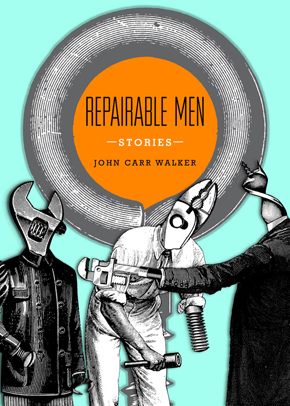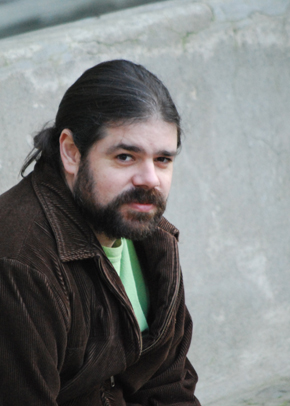“Repairable Men”:
An Interview with John Carr Walker
by Karin C. Davidson
 The stories of “Repairable Men,” John Carr Walker’s first collection (Sunnyoutside, 2014), are streaked with clarity, decision, and surprise. There is lightning in every one of the ten, the kind that travels sideways, striking in the most unexpected places—places along the West Coast, where raisin crops ripen in the sun or mildew and rot in the damp, where families try for understanding and conciliation and rarely end there, where objects are raised overhead, recalling lost opportunities, countries, minds. The characters here have dreams, grape knives, wolf pups, jack saws, wrenches, dead birds. Their tools are heavy, worn, close to grip, and the way they use them is brilliant and shocking. To read the stories of “Repairable Men” is to enter a world that is even more real than our own.
The stories of “Repairable Men,” John Carr Walker’s first collection (Sunnyoutside, 2014), are streaked with clarity, decision, and surprise. There is lightning in every one of the ten, the kind that travels sideways, striking in the most unexpected places—places along the West Coast, where raisin crops ripen in the sun or mildew and rot in the damp, where families try for understanding and conciliation and rarely end there, where objects are raised overhead, recalling lost opportunities, countries, minds. The characters here have dreams, grape knives, wolf pups, jack saws, wrenches, dead birds. Their tools are heavy, worn, close to grip, and the way they use them is brilliant and shocking. To read the stories of “Repairable Men” is to enter a world that is even more real than our own.
Our father kept the knives in an old sweatbox. The spiders had a year to weave nets inside. He dumped the box on the workbench and black widows ran from the pile, most of which he smashed with the pad of his callused thumb. Their webs, as thick as fishing line, stuck to the knives. The blades were curved, a wing of flat steel from wooden handles, loops of twine for the wrist, all black from use.
–John Carr Walker
KARIN C. DAVIDSON: John, I’m in awe of the stories of “Repairable Men.” Relationships are at the forefront—brothers, fathers and sons, husbands and wives, children and parents. And the world here is incredibly realistic, but the narrative leans in, closer and closer, until a darker side takes hold. Even in the darkness, however, there is a bright thread of compassion.
Tell us about your characters, their worlds, and how you balance the dark and the light.
JOHN CARR WALKER: Thanks, Karin. There’s a term in painting, chiaroscuro, which broadly refers to a treatment of light and shade. It’s an Italian word that has its origins in two Latin words, clarus and obscurus, from which are derived the English words clarity and obscurity. So, to stretch a little, in the word chiaroscuro there’s both clarity and obscurity. As I clarify a character or a landscape or an action, I am inevitably obscuring a different character, landscape, or action. There’s a point in drafting, always late in the process, when I tip far enough that I’m seeing a few small things very clearly while everything else is in shadow or complete darkness. The tensions, and to a great extent the plots, come out of this fixed, intense, and very subjective clarity that obscures the rest of reality from view.
DAVIDSON: In “Ain’t It Pretty,” the final act is shocking and sublime—all at once, the ending, the beginning. In “Candelario,” the main character, never stripped of his pride, has “always known there are no repairable men.” In “Brother Rhino” a boy, troubled with loss, has dreamed, “…of hunting the rare white rhino.”
Would you tell us about the brothers in these stories and how you approach brotherhood in your writing?
WALKER: I don’t have a brother in real life. I find that I like writing into things I don’t know much about, and I love it when my work assigns me homework—when a story I’m working on sends me back to Russell Banks’ “Affliction,” for example, a great novel overflowing with brotherly love and deep, silenced frustration, and I can see it with new, thieving eyes. Also, when writing what I don’t know, I can’t cheat by using what I’ll broadly term “smarts”—that is, the comfortably familiar, the previously known, the much admired technique copied from another writer (even when it is Russell Banks). My stories get weirder faster when I’m on shaky ground as an expert witness, and I’ve learned to trust that weirdness.
DAVIDSON: Against the backdrop of a distant Mount Saint Helens in Oregon’s Columbia View Park, beside the locked gates of the Mariners’ Stadium in Seattle, deep among the redwoods of northern California’s Midpines and Mariposa, sons and fathers rise to the occasion. In “The Atlas Show” and “The Rules,” old ways are nearly traded for new, and power and possibilities are exchanged for respect, gratitude, understanding.
There is devotion here. Is this something you yourself found in childhood and again in fatherhood?
WALKER: Although I wrote in college and a little bit before that, I didn’t start taking it seriously until after I became a father, so without a doubt that’s influenced how I treat father-son relationships. I do, however, write more often from a son’s point of view than a father’s. It’s the more fraught position, at least in fiction, or so it seems to me. Being the son, being forever young, looking for shelter and wisdom instead of having to provide them, seems to present more potential for danger and externalized disappointment: What if shelter and wisdom can’t be found? What happens next?
I personally feel buoyed by fatherhood. A couple months ago, my wife and I were talking with our son about our lives before he was born, sharing stories of how we met, our rather disastrous first date, what our wedding, eventually, was like. My wife told him that when he was born, I wasn’t writing. I was a high school English teacher. “Interesting,” he said, and that was all, but gave me a look I’m not sure how to interpret—Shock? Disappointment? Perhaps I’d become more complex in his eyes, or perhaps less so. Either way, isn’t it interesting that the young man who shares my genes, and a small space on the planet with me, and time in the amount of his whole life, so far, must still quietly take stock of me now and again? It’s the oldest cliché that our children grow up in the blink of an eye, but I wonder how we in-adaptable parents must look to them.
She looks at the helmet like an impossible thing, a souvenir brought back from a dream. She arranges the chinstrap so it curves along the top of the yellow shell and holds it before her, as if she means to put it on, as if one could know the unknowable wearing it.
–John Carr Walker
DAVIDSON: “Retreat” winds up, tighter and tighter, then pauses inside the spin to ask, “What’s going to happen?” “Turning Over” questions sadness—a rabbit named Wink the turn in a relationship. “Pups” punches the breath out of story by leaning hard into itself, restless but patient, willing to wait for an ending that lies beyond the last line.
Couples call out from these stories, exposing the rough kind of togetherness that eventually divides. What writers do you admire who also delve into duos and the territory of marriage?
 WALKER: James Joyce’s “The Dead” is my favorite marriage story, but it’s hardly the story of a duo. Gabriel and Gretta spend most of the night at a family party. Later, in a cab they share with Mr. D’Arcy, Gabriel sweetly remembers scenes of from his married life, his desire for his wife rising. (I’ve walked from Usher’s Island to the Gresham Hotel on O’ Connell Street, by the way, and it’s not a long and winding road. He’d have minutes to nurture these thoughts, which makes their presentation even more remarkable.)
WALKER: James Joyce’s “The Dead” is my favorite marriage story, but it’s hardly the story of a duo. Gabriel and Gretta spend most of the night at a family party. Later, in a cab they share with Mr. D’Arcy, Gabriel sweetly remembers scenes of from his married life, his desire for his wife rising. (I’ve walked from Usher’s Island to the Gresham Hotel on O’ Connell Street, by the way, and it’s not a long and winding road. He’d have minutes to nurture these thoughts, which makes their presentation even more remarkable.)
Once in their room, enter poor dead Michael Furey. The story Gretta tells, and the guilt she carries over his death, makes Furey into a ghost, and his appearance, so to speak, disrupts the moment—and will surely haunt the marriage—in a tangible way. In fact, it’s powerful enough to shade what’s been, not just what’s to come. A marriage already crowded by family and social obligation is further crowded by Gretta’s personal history. As Gabriel watches the snow falling on Dublin, and as Joyce draws out his consciousness to consider all of Ireland, then all of humanity, I cannot but wonder what Gabriel will see when he next looks at Gretta. What will he say? How will he act? But it’s a great way to leave it, the young man musing on the entire world instead of facing his wife.
Koi swam through my eyes, in and out my ears, breached my mouth. When I pictured what my life would have been like in Vietnam, if I’d never been adopted, this is what I see: my face rippled in water, flat sky above, empty country on all sides.
–John Carr Walker
DAVIDSON: The final two stories in “Repairable Men” examine characters more solitary than those in the other stories. Identity is searched and found by Amelia in “A Sword from my Country,” and obsessions of grandeur lead Pet to see “what a pretty world we’ve made, so full of perches.” Both stories occur on that particular day, the moment in time when everything changes.
Joy Williams, in a recent interview (Paris Review, Issue 209, Summer 2014), when speaking of her characters, brought up the terms Sehnsucht and hwyl, respectively German and Welsh, their meanings having to do with longing. Do you find that your characters possess this same quality, the kind of longing that is unexplainable, inconsolable, and out of reach?
WALKER: I’m glad you mentioned that the book ends on a solitary note. One of my constructions was to begin with reconciliation and move toward solitude. “Retreat,” which you mentioned previously, acts as the hinge for the book, the point where the characters stop reaching for reconciliation and begin looking for ways out. What comes after failed reconciliation? Fuck you. That’s the point Grandeur and Sword, and Pet and Amelia, have come to. They act without regard for their bodies, which can happen to people who lose their way. In fact, they long to get out of their bodies.
It seems appropriate to me that the words Joy Williams chose to describe these qualities of longing are untranslatable into English. That’s why we need literature—and in particular need the short story, which deals so well with loneliness and isolation—because we can’t come to terms with deep longing any other way. Our language is not adequate to understand our lives so we must charge language with story. Perhaps our bodies are not adequate for our lives? But, you know, one can’t just say that kind of stuff.

Karin C. Davidson, Interviews Editor

0 comments on “Interviews: John Carr Walker”